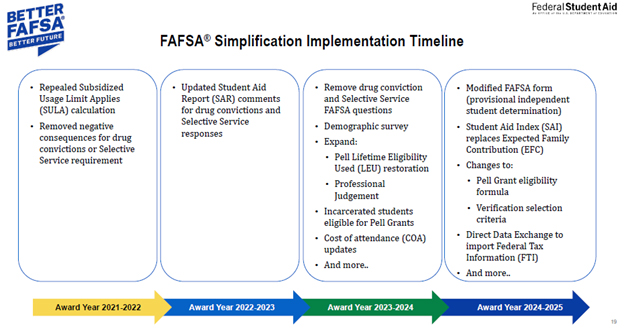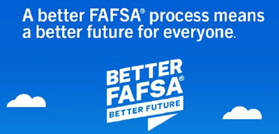Beginning Tuesday, March 18, 2025, the Business Office will be temporary located in the Admissions and Records Office Room P203
Related Pages
Changes are coming to financial aid in 2024-25!
Why are things changing?
On Dec. 27, 2020, Congress passed the Consolidated Appropriations Act. The law contains provisions that amend the FUTURE Act and includes the FAFSA Simplification Act—a sweeping redesign of the processes and systems used to award federal student aid.

Changes are occurring in phases and started in the 2021-22 award year, with full implementation planned for the 2024-25 award year. Here is what’s happened so far and what’s to come:

Due to the volume and complexity of these changes for 2024-25 only the FAFSA will be released in December, no later than December 31, 2023. The 2025-26 FAFSA will return to its normal October 1 release date.
What is NOT changing?
- Students must complete a FAFSA every academic year. The 2024-25 FAFSA applies to Fall 2024 and Spring 2025.
- Questions introduced in 2023-24 about the applicant's sex, race, and ethnicity have no effect on federal student aid eligibility and remain only for statistical purposes.
- Dependency status questions to determine if your parents must provide their information remain the same.
- The FAFSA will still be based on prior-prior year tax information. For the 2024-25 FAFSA that will be the 2022 tax year. Students and families who have had a significant change in income or ability to pay since that tax year may still request a Special Circumstance Appeal.
- You must still be a U.S. citizen or eligible noncitizen to receive federal student aid.

What IS changing?
- The FAFSA will be streamlined to make applying easier. Fewer questions will be asked and the income information for most students and families will be transferred directly from the IRS.
- The FAFSA will be role-based and the person in each role is called a contributor.
- Roles = Student, Student Spouse, Parent, Other Parent, and Preparer.
- For dependent students, the parent whose information needs to be on the FAFSA may be different.
- All contributors will need an FSA ID, which is a username and password that allows you to login to your StudentAid.gov account and complete the FAFSA. Parents, stepparents, and student spouses without a social security number will now be able to create an FSA ID and electronically sign the FAFSA.
- All contributors must provide consent and approval to transfer federal tax information directly from the IRS. If the student and all required contributors do not provide consent and approval, the student will not be eligible for federal or state financial aid.
- The Expected Family Contribution (EFC) will be replaced with the Student Aid Index (SAI).
- Students classified as Dependent on the FAFSA who cannot provide parent information will be given a Provisional Independent Status. These students should contact the financial aid office to request an Unusual Circumstance Appeal.
- Changes have been made to the formula that determines a student’s eligibility for federal student aid.
- The method for determining eligibility for the Federal Pell Grant is changing. More students should qualify for the Pell Grant and positive changes are coming to how much students can receive.

Connect with Northeast State